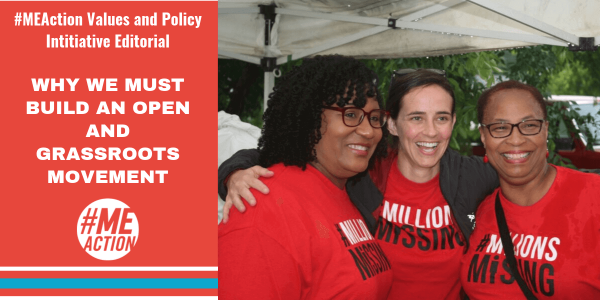Listen to the article:
Values & Policy Initiative
This article is part of our Values & Policy Initiative, a six-month long process for the community to come together to learn and discuss our core values, tactics and positions so that we are more unified in our work as a large, diverse community. This process will culminate in a statement of principles and values as well as a formal policy platform, which the community will ratify with an up-or-down vote. Visit our Values & Policy webpage to see published articles, and our timeline for discussion. #MEActionVPI
Join our upcoming Community Call to discuss our values and tactics on Wednesday, October 30th at 10 am PT / 1 pm ET / 6 pm UK
At its core, grassroots organising is about mass mobilisation of communities towards a shared goal and the encouragement of others to organise themselves. This model demands the creation of spaces that support new advocates to join and grow, and spreads the responsibility and power for action horizontally across the community. It promotes the sharing of resources, tools, skills and knowledge to create a representative, effective and informed collective as the foundation for political action.
This type of movement has created enduring change in so many aspects of our lives. From civil rights, to LGBTQ rights, women’s rights, workers’ rights, disabled people’s rights, environmental rights and many more, our world has been changed by collective action. None of these rights were won by waiting for those with power to look sympathetically on a marginalised group; they were won because that marginalised group of people demanded better.
We are organising and advocating based on the work of those who have come before us. Ours has been and will be a long fight. No single one of us can carry this load alone. Instead, we should see this as a team relay race. By building momentum together, we create both the opportunity and support for each person to run with their talents as they can. We can create a community in which we know there are multiple people who can take on each task, and that always works to mentor and share so that we are never dependent on just one person.
We should be proud to continually pass the baton of responsibility as different people’s strengths and capacity allow them to step forward – be that for an action, a submission to government or research funders, a protest, a meeting, or even writing an email or creating a graphic. In doing so we create a more resilient movement that will better weather the crashes and fluctuations in capacity that plague our community, and the obstacles that will be put in our way.
Further, the power that comes from so many voices allows us to battle stigma in a way that would never work in a top down organisation. We can change the language we use in our own discussions, bolster one another’s knowledge and confidence, and model how this disease should be described and discussed. This collective energy becomes the outward facing voice, a force for reaching those with influence and power, as well as taking control of the public narrative.
Activism that is genuinely grassroots promotes deeper engagement and ownership of all that is done, including the successes and losses, amongst everyone who participates. It builds a movement that is yours, and gives you the ability to mould and shape the work – separating it from so many organisations that you can choose to support from afar but do not necessarily contribute to.
None of us have the monopoly on this disease. We are constantly learning and better articulating the story of ME. Grassroots organising enables us to set our values and principles together, to share a common understanding of where we’re trying to get to and how we wish to get there. It empowers those able to speak up, gives mandate to work towards specific goals, and creates a known set of guidelines that we can hold people’s actions to account over, both in terms of their decisions and their behaviour.
However there are difficulties to grassroots organising, the vast majority of which are in no way unique to ME. The sheer volume of ongoing discussion can be prohibitive, whether due to time constraints or for many of us cognitive constraints. In some movements this can become like wading through treacle. It is crucial that decision making is as slick as can be. For this, the wider strategic aims and policies should have input from as many as wish to, whilst operational decisions and actions should be delegated appropriately with full regard to transparency and inclusion. In doing so we recognise disagreement is inevitable, and so welcome constructive dissent that leads to better outcomes.
Top-down structures have in the past failed us, and left those with ME reactive instead of proactive. They create minimal opportunity to hold organisations to account or correct missteps. At times, personal interests can abound and even override the perspectives and needs of the majority. Language loses it’s nuance as those speaking are further removed from the lived experiences of the masses, and there are fewer checks in place to ensure that if there ever is a conflict between what is best for the organisation, especially financially, and what is right for the movement, the latter always takes priority.
Those who have voice and influence must be with the community, not for the community. We will always need people who speak up, or those who knuckle down to understand the nitty gritty of a certain issue, yet by using grassroots organising we take ownership of that as a whole. We make listening a celebrated part of the process. We utilise the incredible expertise our community already has, and the collective knowledge that none of us alone could bring.
Grassroots organising not only increases our chances of achieving the outcome we all want, it gives back to the community too. By actively choosing to take this journey together we uplift one another. We share the highs and lows, common understanding, experiences, friendship and meaning that, for such an excluded and stigmatised population, is difficult to attain elsewhere.
Visit our Values & Policy webpage to read published articles, see the timeline for discussion and join community calls. #MEActionVPI
About the Author: Sian Leary from Sheffield UK has had myalgic encephalomyelitis (ME) for six-and-a-half years; for much of that time, severely affected. As an advocate with #MEAction, she has played key roles in both NICE and parliamentary campaigns over the past year, designed graphics, written submissions to government bodies, articles for the website and contributed to #MEAction UK’s social media presence.






3 thoughts on “Why We Must Build an Open, Grassroots Movement”
Brilliant. Sharing to social media now.
We are all aiming for the same awareness…the Reality of what the illness, M E, is. The education of medical people. To have it treated as the Biological illness that it is, and to get the desperately needed treatment in clinics, ‘fit for purpose’. It is a long time coming, but we Will go on pushing until we get what is needed.
Bless you Sian Leary.
We also support the brave Dr Sarah Myhill, Dr Charles Shepherd, Jan Brea, and more recently Dr Nina Muirhead, Dr Paul Worthley of The M E Trust, and many more who fight so hard for us.
Just a thought…Kim Kardashian’s been diagnosed I believe it is Lupus which as many of us had that as a first diagnosis because ANA and SED rate biomarker elevated.
Once that was in somewhat normal range many of us never recovered and the DR’s did not know what to do besides anti depressants.
Know antivirals, gamma goblin infusion, peptide T, low dose Biaxin ( for gut) as well as mild pain management such as tramedol has help manage my symptoms a bit better.
As well as live probiotics, minerals and vitamins.
Interesting is my sugar craving…I constantly need sugar any form from fresh fruits to lemon aid and yes my glucose levels should be extremely high but they are not.
Thanks for all the work and moving forward with the ME/CFS movement it has given me hope!!!
Catherine
Comments are closed.